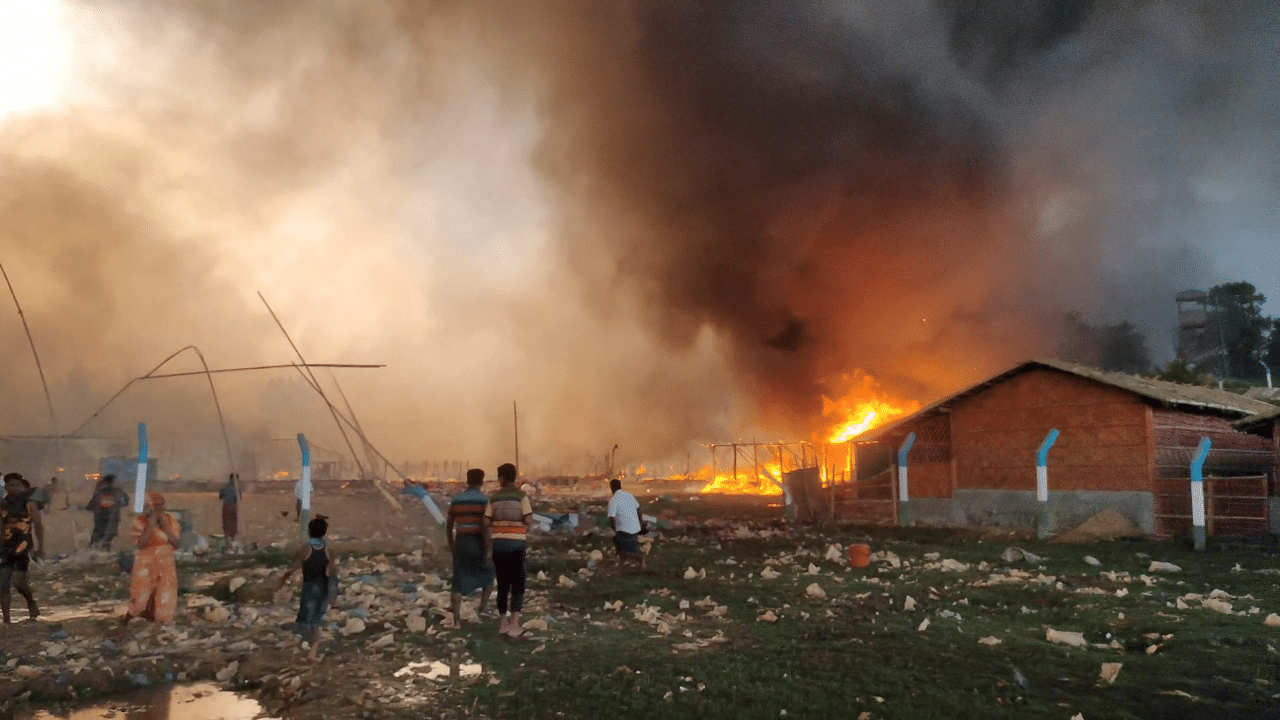
At least 11 people were killed after a massive overnight fire swept through three crammed Rohingya camps in Bangladesh's southeastern Cox's Bazar district, destroying thousands of shelters housing 45,000 people, a senior Bangladeshi official said on Tuesday.
Disaster Management Ministry's Secretary Mohammad Mohsin confirmed the number of people who died in the inferno. However, a UN agency earlier reported that 15 people have lost their lives in the incident.
"Eleven people were killed in the fire as the blaze swept through three Rohingya camps," he told the media.
He added 45,000 people lost their shelters as the fire burnt 9,300 makeshift shanties, which the UN and aid agencies call "provisional shelters".
"The government has constituted a seven-member committee to investigate into the fire while it has been asked to submit a report in the next three days," the top bureaucrat of the disaster management ministry said.
However, he could not ascertain immediately whether anyone remained "missing" in the incident, while the UN Refugee Agency (UNHCR) earlier feared some 400 Rohingyas remained "unaccounted for, maybe somewhere in the rubble".
Bangladesh's Refugee Relief and Repatriation Commissioner Shah Rezwan Hayat said that the blaze also destroyed three donor-run hospitals and a police camp.
The official Bangladesh briefing came hours after the UN Refugee Agency (UNHCR) reported the fire to have killed 15, a figure which is, in a subsequent statement, said was "based on provisional reports".
The government or the aid agencies did not speculate the cause of the blaze but fire officials and police said they did not rule out the possibility of any sabotage as the investigations were launched.
Another UN-backed body, International Migration Organisation (IOM) which also operates at the camp area, said the fire caused "catastrophic damage" at the "world's largest refugee camp" in Cox's Bazar damaging as well its largest health centre.
"The loss of the . . . health centre, which served more than 55,000 people in the last year, now further complicates the challenge of responding to COVID-19," an IOM statement said.
It said the fire that raged through the camps "only slowed once it reached the main roads, slopes, canals and rice fields" while it subsided "not before consuming essential facilities, shelters and the personal belongings of tens of thousands of people".
“This disaster is a terrible setback that exacerbates the humanitarian needs of refugees in Cox’s Bazar . . . "We will need to start from zero to rebuild,” said IOM’s Director General António Vitorino.
UNHCR spokesman Johannes van der Klaauw said earlier, virtually joining a news briefing in Geneva, "what we have seen in this fire is something we have never seen before in these camps. It is massive. It is devastating".
Both UNHCR and the IOM said they joined the government-led campaign to provide critical support and protection to some 45,000 Rohingya refugees who lost their shelters and belongings in the devastating blaze.
The UNHCR said that with an unknown number of refugees having sustained burn injuries, it provided medical supplies through the International Red Cross (ICRC) in support of the management of burn patients.
Bangladesh officials initially reported seven deaths as searches were underway and alongside the shelters, the fire destroyed six makeshift health facilities, including four bigger hospitals.
Bangladesh is hosting over 1.1 million Rohingya refugees in Cox's Bazar, who fled Myanmar facing military crackdown, often considered as "ethnic cleansing" by many rights groups.
The fate of the refugees' return to their country remains uncertain as Myanmar's military seized power last month detaining the country's de-facto leader Aung San Suu Kyi.
The military coup took place at a time when Bangladesh was spearheading a desperate campaign for the safe return of the Rohingyas.